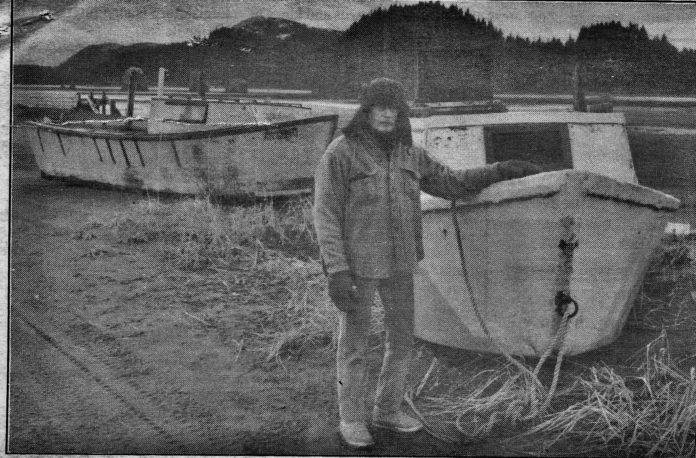
One of the pleasures of writing Cordova Chronicles is the things that pop up on my computer in response. Consider this e-mail recently forwarded from the office of The Cordova Times:
“I recently found a 6 year old article where you wrote about Brooke Atkinson who lived out at Boswell Bay on Hinchinbrook. I spent several years in the early 90s out there at the FAA station where Brooke and I became good friends. Well, over the years and for reasons of life we lost contact. What became of Brooke, he was an amazing character, he always stayed at my home in Hope, AK, when he came to town. Thank You, Jeff Kinzel.”
Believe it or not, Mr. Kinzel was referring to the August 19, 2017 Cordova Chronicles titled “Cordova Fisherman scores TKO over brown bear” in which I wrote about young Robert Cunningham stopping a charging brown bear on Softuk Bar with a single punch to its nose.
In the article, I happened to include mention of a tale about Brooke Atkinson, who lived over in Boswell Bay and carried a homemade walking stick with a large knob on the end which served the same purpose.
Who needs bear spray or a gun, right?
Well, Cunningham stands over seven feet tall; and as it turns out Atkinson stood tall, very tall, as the commander of a U.S. Army Special Forces intelligence unit in the Pacific during WWII.
In the hierarchy of awards for bravery in combat, the Medal of Honor ranks highest, but close after that comes the Silver Star and the Bronze Star. And, of course, the Purple Heart goes to those wounded or killed in combat.
Can you believe that during his service, Atkinson received a Silver Star, two Bronze Stars, and two Purple Hearts?
Sure bet that that wasn’t from facing charging bear.
Atkinson was born February 18, 1924, in Bellingham, Washington. After graduating from high school, he volunteered to serve in the U.S. Army.
After the war, he earned a secondary teaching degree from Southern Oregon State in 1951, and a double master’s degree in English and philosophy from Portland State in 1952. But he wanted to return to Burma to investigate the religion of Tibet, because “After the war, I had no faith in God or man.”
The next year, while awaiting a ship to sail east, he took a class in philosophy, where he met Marjorie Elizabeth Ferris. They were married on Sept. 19, 1953 in Medford, Oregon.
Atkinson and his wife first visited Alaska in 1956, and then came back to live in 1957, where he taught at Anvik on the Yukon River and then later at Pilot Point.
In 1960, he was hired by then Cordova Superintendent Barney Anderson to teach fifth grade. By the time he retired in 1963, he and his wife, a substitute teacher in the Cordova schools, had bought a parcel of land on Hinchinbrook Island and built a cabin there for retirement.
An English major in college and decorated war veteran, surely the solitude of the sea and Alaska wilderness beckoned.
An article in the Nov. 29, 1990 Cordova Times by Don P. Adams titled “Teacher finds peace” describes his quest: “During the winter peace and quiet on Hinchinbrook Island, a retired teacher from Cordova is writing his third book. A visionary who lives as close to nature as humanly possible, the book is titled ‘Melody of Life.’”
Books were a big part of that solitude. In addition to writing several, Atkinson estimated he had 7,300 volumes in his remote cabin. And of course, Henry David Thoreau’s “Walden Pond” was one of his favorites.
His wife Marjorie died of cancer at their home in Boswell Bay on July 19, 1982.
Atkinson died of cancer at a private residence in Anchorage on Dec. 23, 2004. He never did make it to Tibet, but used Tibetan monastic techniques of meditation throughout his life at Boswell Bay.
Five faded black and white photos by Adams accompanied the Cordova Times feature about Atkinson, and their content pretty much summed up his simple subsistence life in solitude: making pancakes on a stove top, writing at his desk loaded with books and notes, splitting firewood for the upcoming winter, standing by his old cabin skiff, and meditating wrapped in his Tibetan blanket.
Nowhere does The Cordova Times piece mention one of Atkinson’s first books, an account of his personal experiences in WWII titled “Through the Flaming Lances of Hell.”
Perhaps in Alaska he finally discovered peace from that experience.
And I am sure the brown bears of Hinchinbrook discovered not to mess with a quiet man who carried a many memories and a big stick.
(Note: A special thank you to Cordova historian Dixie Lambert for her research for this story.)
This story was originally published in the March 29 issue of The Cordova Times.














